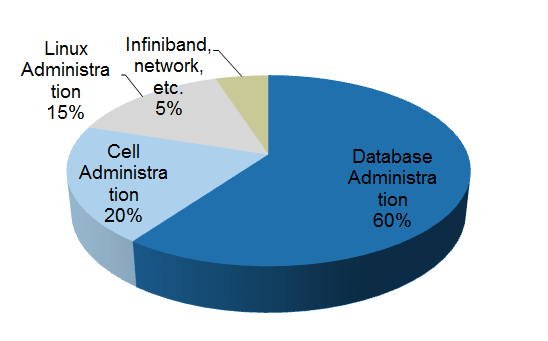Question: what do the following two pairs have in common:
– Oracle database and non-Oracle hardware/software
– Rowan Atkinson and Audrey Hepburn?
My answer: they are both good but don’t fit very well into the same picture.
Creating a back-end database system based on multiple vendors’ components make less and less sense nowadays. Consider the following:
Which one would you go after, left or right? To make it more clear, choose between Exadata and IBM POWER7 with AIX OS on top of EMC being monitoring with BMC Patrol and backed up with HP Data Protector integration?
I have witnessed from my experience that hardware and software components from multiple vendors are complex to support. No one supplier is usually accountable at a system level.
In a consolidated database environment, a complete test of a major change often must include synchronous testing the multiple workloads in order to catch situations where a change in one area might cause an issue in another. Patching for example one component breaks sometimes another one.
With Exadata, Oracle provides a single point of support for the Oracle Exadata Database Machine both for hardware and software. Support problems are resolved much faster than where multiple vendors are involved and can be reported and managed by the DBA. But is the Exadata DBA still just a DBA?
Kevin Closson used the term Oracle Platform Administrator (OPA) in a response to an article from Martin Bach about the meaning of Exadata experience.
Let me quote Kevin:
“It’s nearing the point where an Oracle DBA cannot do everything that is expected. The acronym no longer really fits. Database Administrator? What does that have to do with cellsrv? DBA? What does that have to do with clusters (at the platform level [you mention fencing]), etc, etc, etc.
It’s nearing time that there should be two roles:
1) The Oracle Platform Administrator (OPA)
2) The Oracle Database Administrator
The DBA tends to the *contents* of the database and applications’ needs for data from the database, tuning, etc. The OPA deals with all the activity that was once the domain of the System Admin and Storage Admin and, moreover, the OPA deals with the crushing load of maintaining Oracle software (patching).
I can’t see it any other way. Oracle has moved their technology stack in a direction that essentially warrants this split in responsibilities. Think of any other RDBMS product where the DBA is expected to be a platform administrator as well. I’m not saying good or bad on that matter, but it is high time to consider the split.”
Uwe Hesse has just written an excellent blog post entitled “How Exadata will impact your IT Organization”. The difference between the Exadata Database Administration (EDBA) and the Oracle Platform Administrator (OPA) is probably close to zero. I see it more like that the EDBA is just a DBA managining also Exadata, while OPA is more of a general admin having excellent DBA skills. Semantics!
Obviously, additional training for the DBAs is needed but by no means the 285 days of new DBA training for existing Oracle DBA suggested by Allen Licitra and Mark Shainman. I wonder how that number was calculated and if we are talking calendar or workdays 🙂
I would highly recommend Enkitec’s Course on Oracle Exadata Administration!
Arup Nanda suggests that the role should have the following skillsets:
I would furthermore split the Database Administrator part as follows:
I do not know where the meetings and conf. calls fit in.
But as Andrew Carnegie said: “Concentrate your energies, your thoughts and your capital. The wise man puts all his eggs in one basket and watches the basket!” And who else to that on the Oracle side but the Oracle Platform Administrator.




